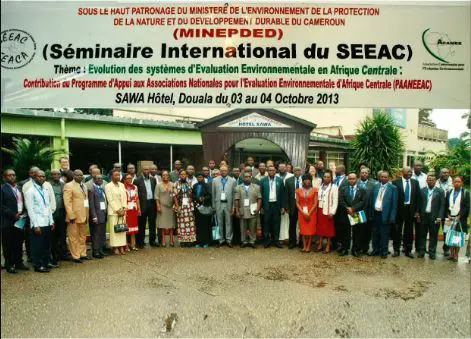The NCEA was requested by DGIS to execute a support programme for EIA associations in eight countries in Central Africa. The programme strengthened national associations of EIA practitioners and their regional umbrella organization SEACA. This helped these organizations to support governmental EIA agencies. The programme thus enhanced the national EIA system and improved incorporation of environmental considerations in decision-making. The programme ended in 2013, during SEACA's annual meeting and fifth international seminar in SEACA’s host country Cameroon.
Process and activities
DGIS was requested by a number of Central African countries to implement an EIA support programme. It agreed to the creation of PAANEEAC (the French acronym for the programme) in 2007 and entrusted the administrative and technical framework to the NCEA.
The NCEA provided various types of support during this programme. They can be summarized as follows:
- Technical support: training of trainers, conducting studies, making technical assistance available;
- Support in financial administration and autonomy: development of a financial management instrument, training, conditionality of grants (stimulating financial accountability), coaching, experimentation (learning by doing).
Results
The programme has created functional working environments for the national associations and umbrella organization SEEAC. Thanks fo a physical and virtual framework for cooperation and exchange, the organizations have substantially increased their visibility and credibility. Membership numbers have increased and networks with EIA stakeholders were strengthened. PAANEEAC also contributed to improvement of the legal, regulatory and organizational framework for EIA. Concrete improvements are visible, for example in the writing of procedural manuals. Although management and coordination of information on EIA continues to be a weak link, capacity of EIA actors was certainly developed. The promotion of EIA as an instrument of good governance was less successful: the decision-making procedure for environmental authorisation is still a black box in each of the countries.
Follow-up
Since the end of PAANEEAC, in 2014, the NCEA has continued coaching SEACA. NCEA and SEACA have signed an MoU for five years. SEACA wants to continue to support its members, strengthen EIA systems in the region, contribute to their regional harmonisation, and develop their capacities. Thereby it can consolidate its position as a centre of knowledge and expertise on environmental assessment in the region.
The NCEA also continued to provide coaching and technical assistance to both EIA associations ánd EIA administrations in Burundi and Rwanda, two DGIS partner countries eligible for bilateral support from NCEA.
Further information
The concluding technical report can be found above, and all relevant documentation on the programme, including an extensive evaluation of its impact, can be accessed on the right.
The NCEA published a book on this programme, titled ‘Evolution of environmental assessment systems in Central Africa: the role of national professional associations’. It presents the programme approach, results and lessons learnt, as well as a detailed description of the current status of the EIA systems and their functioning in the participating countries. The book is available in French and English, in hard copy and electronically, through NCEA and/or SEACA. It can be found at the right of this page.


